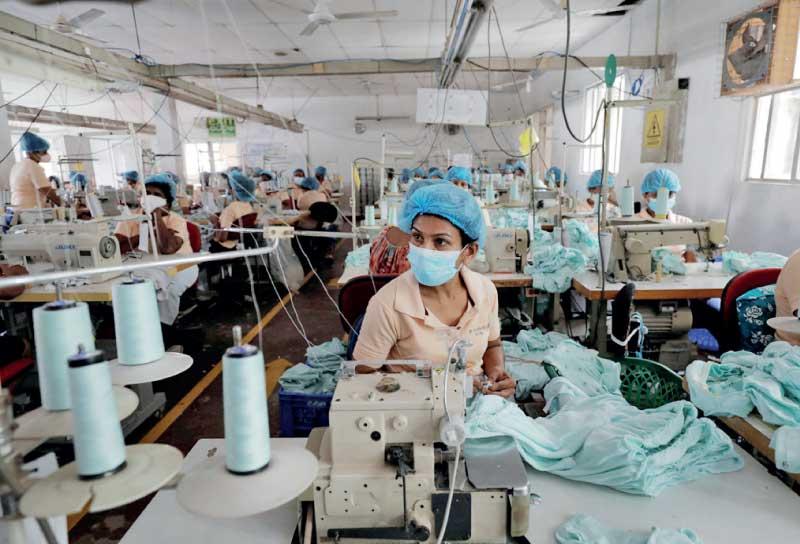Reply To:
Name - Reply Comment
Last Updated : 2024-04-27 07:01:00

Sri Lanka, a nation where women account for 52% of the population, grapples with a troubling disparity in female representation within the workforce. Despite advancements in education and a growing number of female university graduates, women’s participation in the labour market remains dishearteningly low, hovering between 30-37% for more than a decade.
 This glaring gender imbalance calls for immediate action to address the structural barriers that hinder women’s employment prospects. In particular, the outdated and restrictive labour laws surrounding working times for women need to be overhauled to foster inclusivity and empower women in the workplace.
This glaring gender imbalance calls for immediate action to address the structural barriers that hinder women’s employment prospects. In particular, the outdated and restrictive labour laws surrounding working times for women need to be overhauled to foster inclusivity and empower women in the workplace.
The number of women in office work, particularly in leadership roles, is even more significantly low, despite the increase in female university graduates over the past few years, reports show.
To increase the proportion of women in employment, we need laws that focus on enabling participation rather than restricting it.
Sri Lanka’s current labour laws concerning working times for women are counterproductive in this sense. These antiquated laws, although stemming from the intention to protect women, have consequences that discourage female employment, from both an employer’s and potential employee’s standpoint.
Online discussions by the Colombo-based thinktank Advocata Institute highlighted the role of working hour restrictions in limiting women’s opportunities to work.
“We have been looking into the constraints that prevent women from entering and being retained in the labour force. A significant factor which we found to be responsible for these constraints was our gender-biased labour law,” Advocata Research Assistant Thathsarani Siriwardena told the Daily Mirror.
Night Work
The Shop and Office Employees Act, Employment of Women, Young Persons and Children Act and Factories Ordinance place restrictions on a woman’s right to engage in night work. In most industries, women over the age of 18 can only work until 8 pm. In certain jobs such as in the hotel and tourism industry, the cutoff working time for women is 10 pm. These constraints on working times not only limit the number of hours for which a woman can earn, but also deter employers from recruiting female candidates as, after a particular time, a male counterpart is required to take over. This often acts as reasoning for employers to prefer male candidates over women applying for the same job role. For instance, in the hotel and tourism sector, one of Sri Lanka's leading industries, only 10% of the workforce is made up of women.
There are exceptions to this rule, such as submitting a Night Work Approval Application to the Labour Department. However, a key argument by proponents for the removal of working hour restrictions for women is that there should be no need for additional approval to be granted for a woman to continue working for hours that men are already able to work during. Practically, these gender-specific protocols are yet another process which many employers are unwilling to undertake.
In August 2022, a proposal to amend the Shop and Office Act to allow women in IT-based industries to work the night shift was approved by the Cabinet, which signals progress in this department. It is now a matter of extending this across industries and addressing it in the legal framework.
Part-time and flexible working hours
There are currently no legal provisions which address part-time and flexible working hours. During the pandemic, we saw the applicability of unconventional working systems like the work from home model and part-time work, with an increased call for more flexibility when working. In a post-pandemic world, this adaptive working day can still prove useful and make employment a more appealing and accessible prospect. For women especially, legislating part-time work would promote employment since many women are involved in unpaid care work that may make a traditional working day impractical. Studies show that women with children under the age of 5 are the most vulnerable to leave the workforce, and the availability of part-time or flexible working hours has the potential to change this trend.
Overtime
In accordance with the labour law, the working day consists of a maximum of 9 hours per day, within a 5-day working week. In addition to this, men are allowed to work 12 hours overtime per week. No such option exists for women to engage in overtime work. Despite this, in practice, many women work overtime as certain firms' operations run late. Accordingly, the inclusion of provisions within the labour law which enable women to work overtime would not only enhance women's opportunities to earn, but also promote the regulation of overtime work in a legal capacity. According to Advocata Institute, guidelines to prevent the exploitation of involuntary or excessive overtime work should also be integrated into the labour law.
Why mindset matters
Much of the existing labour laws addressing women in the workforce seem to stem from the intention to protect women. As noted by Advocata Institute, this mindset in itself can be harmful as it carries the misconstrued notion that women are not as capable to engage in work as men. Labour law reform would play an important role in shifting this ideology. The think tank further addressed participation in homecare and childcare. Certain organisations in the private sector have started granting a limited number of days for paternity leave to promote equal participation in care work. This demonstrates the role of both the private sector and the state in modernising gender-biassed views in regards to balancing formal work and unpaid care work.
"Our country is in a very vulnerable place economically. On one hand, Sri Lanka has an ageing labour force. We can also see that most of Sri Lanka's skilled and educated youth are leaving the country. These two factors mean that we are at risk of facing a significant shortage of labour in the future," Siriwardena from Advocata Institute said.
She further noted, "An important observation we have made is that a majority of university graduates are female. It is of utmost importance that we introduce policies and laws that can bring these educated women into the labour force."
Champika Munidasa Tuesday, 04 July 2023 02:28 PM
Women should be given an equal opportunity to show their skills and go up in the corporate ladder. In most offices women do the bulk of work and men who are generally desk heads and department heads get the credit. Women do not want to hobnob with the management level officials because they fear the common gossip that they are trying to get advantage of their feminism. There is a lot of discrimination taking place in both government and private sector offices against women workers.
Martin Milton Monday, 07 August 2023 03:39 PM
This is an absolute disgrace! Women deserve EQUAL PAY. Women need a far more lax system of working ours so they leave work while it is still daylight hours. They also need to be provided with security when entering and leaving work premises.
Bonny Wednesday, 13 September 2023 06:35 PM
Please dont change anyhing at the UDA( Urban Development Authority)as they anyway stop working after 12 noon
THARAKA D V K Monday, 23 October 2023 01:23 PM
These feminists seems to never care about family/child welfare. Men and women carry inborn capabilities to suit the responsibilities expected of them by the nature. Motherhood/housewife are not a disgrace. Uncared young adults, drug addicted young adults, indiscipliened youngsters and the social cost created by the them seems not a part of the equation.

Add comment
Comments will be edited (grammar, spelling and slang) and authorized at the discretion of Daily Mirror online. The website also has the right not to publish selected comments.
Reply To:
Name - Reply Comment
US authorities are currently reviewing the manifest of every cargo aboard MV
On March 26, a couple arriving from Thailand was arrested with 88 live animal
According to villagers from Naula-Moragolla out of 105 families 80 can afford
Is the situation in Sri Lanka so grim that locals harbour hope that they coul

26 Apr 2024
26 Apr 2024